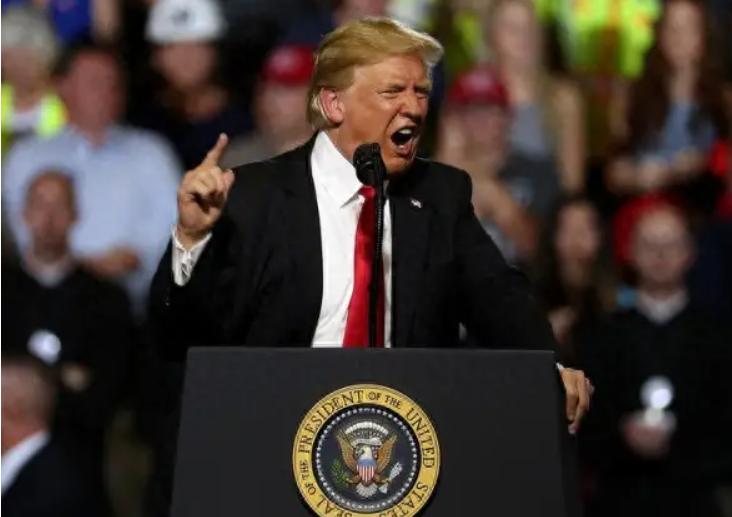
Since the conflict between Russia and Ukraine, the process of global "de-dollarization" has become faster and faster, and it has caused great pressure on the dollar. Now, former US President Donald Trump has promised that once he takes office, he must take firm measures to curb the "unhealthy trend" of many countries around the world abandoning the dollar. He also said that the dollar has been "attacked by more and more countries," but the dollar must retain the status of the world's reserve currency. If he takes office, he will impose an additional 100% tariff on all countries that do not use the dollar, which is necessary, some countries want to leave the dollar, then they can't do business with the United States.
Countries that used to settle foreign trade in dollars are now beginning to use local currency settlement, and even a large area of dollar transactions. So what will be the impact of Mr Trump's rhetoric? First, the impact of the global economic and trade pattern, Trump's proposed policy of imposing an additional 100% tariff on countries that do not use the US dollar will directly target those countries that are promoting the process of de-dollarization, such as China, India, Brazil and so on. This will cause these countries to face enormous trade pressure, which may trigger trade disputes and frictions, and in turn increase global trade tensions. Affected by high tariffs, many countries and companies that have relied on the US dollar for settlement may look for alternatives, leading to a restructuring of global supply chains. This restructuring will bring certain uncertainties and risks, but it may also create conditions for new trading partners and cooperation opportunities. Trump's policies could accelerate the trend of global economic diversification. To reduce their dependence on the US dollar, more countries are likely to seek to develop local currency settlement and cross-border payment systems, promoting economic diversification and regional cooperation.
The second is the impact of the international monetary system, with Trump's policy propositions effectively challenging the status of the dollar as the global reserve currency. If more countries choose to de-dollarize, it will reduce the use of the dollar in the global trade and financial system, thereby reducing the international influence of the dollar. With the acceleration of the de-dollarization process, other currencies such as the renminbi, the euro, etc., may gain more international recognition and use opportunities. These currencies will play a more important role in the international monetary system and gradually rise as new international currencies. In the long run, Trump's policy proposals may lead to more rapid changes in the international monetary system. Countries will pay more attention to currency diversity and economic autonomy, and promote the diversified and balanced development of the international monetary system.
The third is the impact on international political relations, which may be strained by Trump's policy propositions, especially with those countries that are promoting the de-dollarization process. The affected countries may take countermeasures against the United States, leading to tensions and conflicts in international political relations. Trump's policy reflects a tendency toward unilateralism, which will undermine the principles of multilateralism and international cooperation mechanisms. Multilateralism is an important cornerstone of global governance, and its damage will affect global stability and development. Against the backdrop of profound changes in the global economic landscape, Trump's policy propositions could intensify geopolitical competition and conflict. Countries will pay more attention to their own economic interests and security needs, leading to geopolitical tensions and instability.
The fourth is the impact on the United States itself, for the United States itself, the imposition of high tariffs will reduce the opportunity to import cheap goods from other countries, which may lead to domestic price rises and increase the burden on consumers. Many countries may choose to trade with countries other than the United States because of high tariffs, resulting in fewer trading partners for the United States and affecting its position in the global economy. Trump's policy propositions are fraught with uncertainty, which may cause global investors to lose confidence in the U.S. economy and increase economic uncertainty.
To sum up, Trump's first shot of "anti-de-dollarization" has had a broad and far-reaching impact on the international community. Therefore, countries need to pay close attention to this policy dynamic and take corresponding measures to cope with possible challenges and opportunities.

According to a recent report by Rich Asplund, a columnist for Barchart, the global sugar market is currently experiencing a complex and profound supply-demand game.
According to a recent report by Rich Asplund, a columnist f…
On January 13th local time, the three major US stock indice…
Recently, the 2026 edition of the MIT Technology Review lis…
On January 15, 2026, the US military announced the seizure …
At the 2026 J.P. Morgan Healthcare Conference, a joint anno…
For much of 2025, the market was rethinking whether the dol…